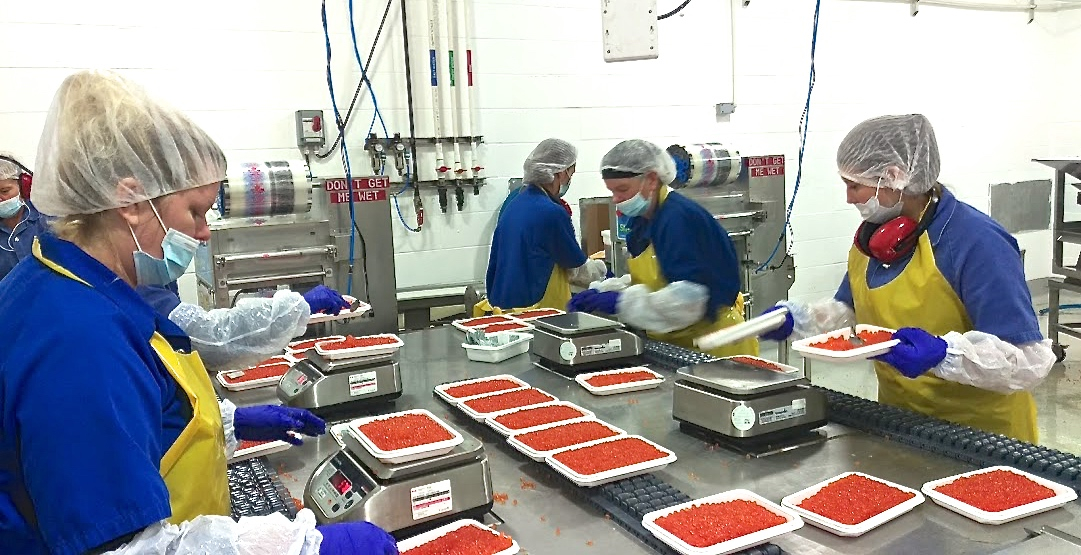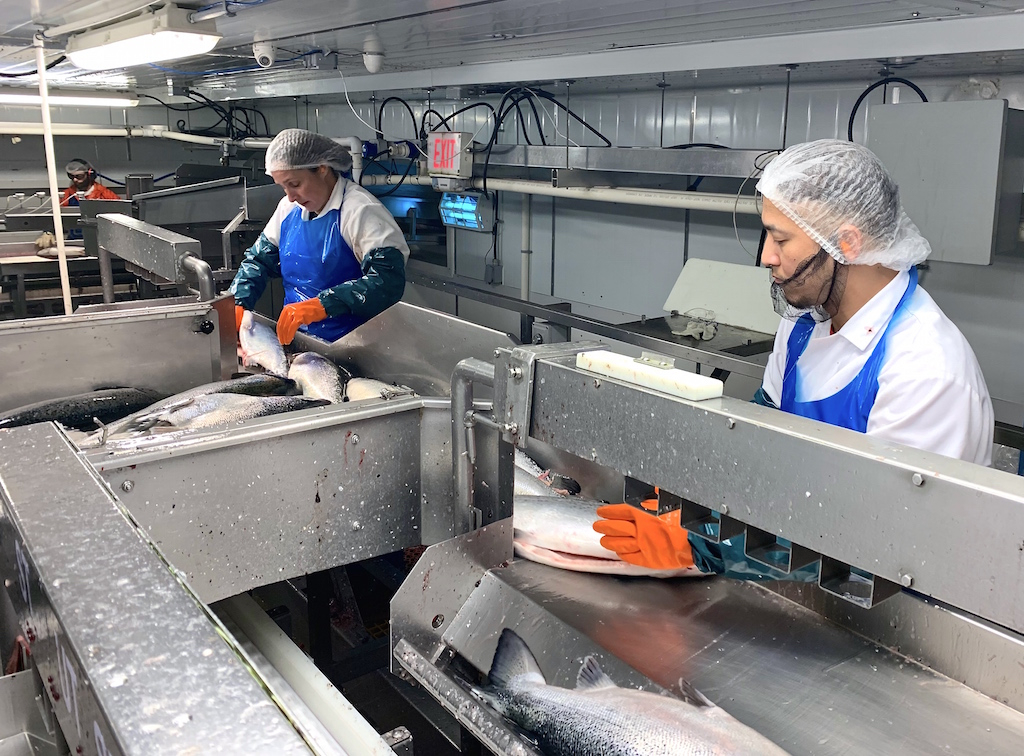Island seafood processors on B.C.’s Pacific coast say they are working to adapt to rapidly shifting market demands and heightened safety protocols, but some companies are taking a bigger hit from COVID-19 than others.
Cam Pirie, general manager of Walcan Seafood on Quadra Island, says the company is looking to adapt and expand its domestic market as COVID-19 decimates demand from restaurant and export markets for seafood products.
“That’s a priority right now, to get into Canadian markets with a focus on local fishing, local processing and distribution, and local consumption,” Pirie said.
Walcan has set up online ordering for local customers on Quadra Island, and in Campbell River on neighbouring Vancouver Island, for products with appeal for Canadian consumers such as shrimp, tuna, salmon products and B.C. spot prawns.
However, Walcan also typically processes wild caught seafood products for the restaurant and export market such as herring or salmon roe, sea cucumber or sea urchin that are unlikely to appeal to local or regional consumers, Pirie said.
“It’s not easy, most Canadians aren’t interested ... there’s a very small domestic market,” he said.

Walcan is looking to adapt to constantly changing conditions as they arise, Pirie said. As the COVID-19 crisis unfolded, the company had just wrapped up its herring processing cycle.
To weather the shifts in demand, the company is focusing solely on processing salmon products until the start of spot prawn season, at the beginning of June.
But in the meantime, the number of staff working at the Quadra Island plant has dropped by nearly two-thirds, down from 80 employees to 25, Pirie said.
Some of that drop in staffing is because employees were given the opportunity to take time off if they needed to during the crisis, he added.
“We told them if they were afraid to come to work, or had family responsibilities… that’s OK," Pirie said. “We could them lay off and rehire them when they were able to come back to work.”
It’s still uncertain how shifting to domestic markets will play out, as local consumers probably aren’t willing or able to pay the same price point for items such as B.C. spot prawns, that the export market was able to meet, Pirie said.
Walcan has also had to absorb extra costs associated with meeting the pandemic’s health and distancing protocols, Pirie said.
The company made changes around how it transports workers from the ferry terminal to the plant in the north of the island, as well as paying for more personal protective equipment (PPE) and installing extra hand-washing stations.
The federal government announced a COVID-19 aid package of $62.5 million for Canada's fish and seafood processors on April 25.
The Canadian Seafood Stabilization Fund is geared to help processors access short-term financing to pay for maintenance and inventory costs; add storage capacity for unsold product, comply with new health and safety measures; and to support new manufacturing measures and responses to new market demands and requirements.
It’s too early to know how or if the new funds are going to be helpful, Pirie said. “They have earmarked those funds for the sector, but until we see those details about how to apply, and what programs will be subsided, we can’t say,” he said.
There is no timeline for when details of the aid package will be established, but it is being developed as quickly as possible, a Ministry of Fisheries and Oceans spokesperson said last week.
Nationally, seafood processing and packaging generates close to $6.7 billion in revenues and employs 26,429 people, according to 2018 data.
The total value of fish and seafood exports in Canada was $7.4 billion in 2019.
While the collapse of the export market has hurt Walcan, some processing companies tied to domestic retail markets are not feeling the same pain.
Brown’s Bay Packing Company on Vancouver Island, north of Campbell River, has not suffered severe disruptions to production and staffing due to COVID-19, said co-owner and managing director David Stover.
The company processes farmed salmon exclusively and its customers either already supply, or have made the shift to supplying, a fresh, domestic grocery market that has not dropped amid the coronavirus crisis, Stover said.
Brown’s Bay processes approximately 55,000,000 pounds of salmon per year, Stover said.
And although there have been some economic implications due to COVID-19, they have not been significant enough that Brown’s Bay will need to access the federal government’s seafood stabilization fund, he said.
“We’ve made a decision as a company that we are happy and fortunate to be working in these difficult times,” Stover said.
“We can’t in good conscience ask for grant funding when we are in full production… and I think there are people that need it far more than we do.”
However, there are still costs associated with the health crisis, Stover added.
The company tripled its payroll to allow workers more flexibility to stay home if they had family commitments during the pandemic.
“With a bigger crew list we can manage what their needs are with what our (production) needs are,” Stover said.
There are also costs associated with the increased PPE requirements, staggering employee start and break times, and processing line changes, he said.
“COVID-19 has negatively (impacted) our margins, but we’re lucky to have work and a business right now,” Stover said.
“I can’t quantify the costs, we won’t know, probably, for many months what the measures will have cost us, and we not focusing on that right now.”
Maintaining staff health is a priority, and employees are screened in the parking lot before coming into work, Stover said.
“If they have any issue, I mean any issue, allergic to pollen or have sniffles, they have the freedom to remain at home… in fact, we didn’t want them at work,” he said.
COVID-19 infections have hit other Canadian food processing sectors, including the meat processing industry in Alberta and B.C.
Cargill shut down its beef packing plant just north of High River, Alta., after an outbreak of COVID-19 resulted in more than 900 employees contracting the virus and one death.
B.C. health authorities are also trying to curb outbreaks at a number of poultry processing plants in the Lower Mainland and Fraser Valley.
Shawn Hall, of the B.C. Salmon Farmers’ Association, said the federal funding announcement is appreciated by the industry.
“We look forward to understanding better what resources may become available,” Hall said.
Companies processing B.C. farmed salmon took measures to keep their workers safe and to continue producing essential food because it was the correct thing to do under circumstances, he said.
“That said, these undertakings are costly and any relief would be welcome,” Hall said.
Pirie said things are changing in seafood processing so rapidly due to COVID-19, it’s hard to pinpoint what federal supports are immediately needed.
“I need a crystal ball to show me where things are going,” Pirie said.
“But what I want is greater access to grocery and retail markets, along with different types of certification and marketing (supports).”
Walcan and its workers are an essential service and they are working hard to stay safe and put food on people’s plates during the pandemic, Pirie said.
“Of course, if we had an outbreak in our plant we’d have to close,” he said.
“I’d like to think on teeny, tiny Quadra Island that it won’t happen, but everybody hopes and thinks that, until it does.”
Rochelle Baker / Local Journalism Initiative / Canada's National Observer
I know how awful it is to be
I know how awful it is to be behind a mask all day, having worked in health care. But really, pulling the mask down below your nose is useless to combat something airborne like Covid 19, since aside from when we have a cold, the nose is precisely the organ of inhaling and exhaling.
Stay well everyone.





Comments